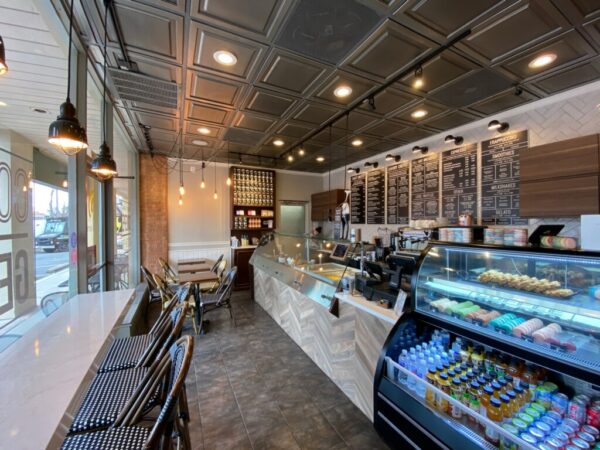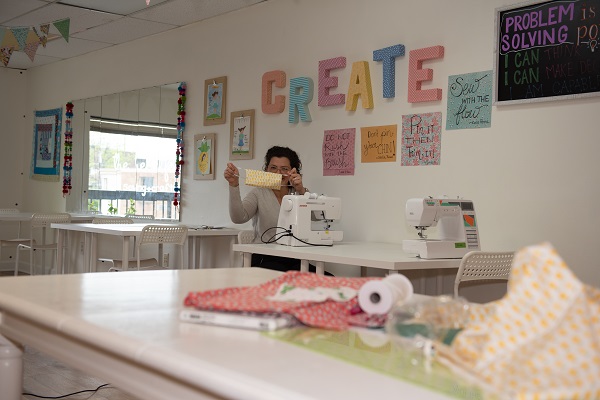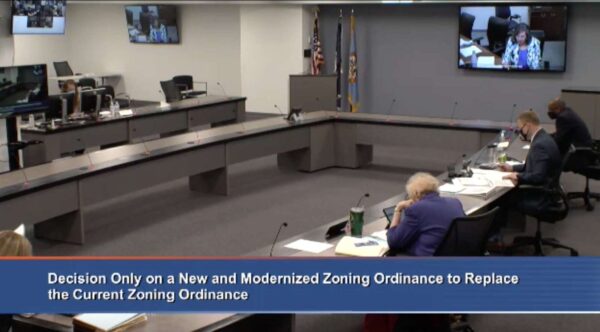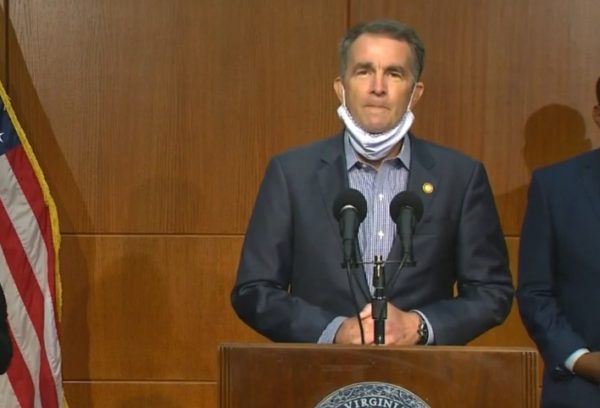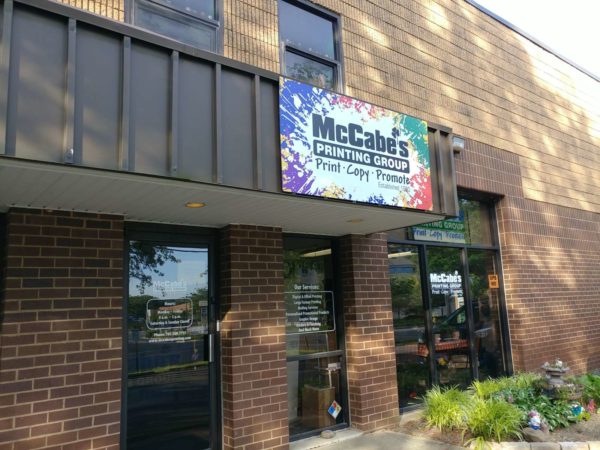A federal relief program that recently ended contributed over $1.1 billion to the Tysons area to help workers.
The money came through the CARES Act, the COVID-19 relief package passed by Congress in 2020 that created the Paycheck Protection Program. In the area, it helped around 1,700 businesses, nonprofits, and sole proprietors with forgivable loans of $150,000 and more.
According to data from the Small Business Administration, which oversaw the program, the Tysons-area businesses and nonprofits that landed the most money in terms of a single award were:
- Digital Intelligence Systems (8270 Greensboro Dr.): the temp agency supported 500 jobs with a $10 million loan, the most that could be received
- Team Washington (1600 Spring Hill Rd.): the local Domino’s Pizza franchisee received $7.9 million for 500 jobs
- Favor TechConsulting (8075 Leesburg Pike): the information technology contractor got $7.9 million for 437 jobs
- SourceAmerica (8401 Old Courthouse Rd.): the nonprofit, which helps connect people with disabilities to jobs, received nearly $7.3 million for 397 jobs
- SecTek (1650 Tysons Blvd.): the private security guard firm got $7.1 million for 500 jobs
Businesses that received less than $150,000 weren’t included in the $1.1 billion figure that Tysons Reporter calculated using SBA data. Other businesses may have also received multiple awards but aren’t part of the list of top awards for an individual loan.
The money was given in the form of forgivable loans. To be forgiven, at least 60% of the money must have gone to payroll.
Details regarding businesses that received the money are available through online databases, such as ProPublica and the SBA. The program ended Monday (May 31).
“The Paycheck Protection Program provided over 8.5 million small businesses and nonprofits the lifeline they needed to survive during a once-in-[a]-generation economic crisis,” SBA administrator Isabella Casillas Guzman said in a news release on Tuesday (June 1). “I’ve heard story after story from small business owners across the country about how PPP funds helped them keep the lights on, pay their employees — and gave them hope.”
The PPP rollout came with some controversy. After reports showed that some loans went to large corporations, hundreds of companies returned the money. The SBA says that 96% of the loans went to businesses with fewer than 20 employees.
Companies that received an initial PPP loan and met other criteria were able to get a second loan. The average amount awarded this year by the program overall was $42,000.
A teenager born when the Brood X cicadas last emerged is now running a business to help people handle these creatures’ unusual life cycles.
With her older brother’s help, McLean High School student Michelle Martinkov started Cicada Defender to sell netting and other products and services to assist people during the cicada emergence and mating season, which happens on this magnitude only once every 17 years.
Michelle notes her parents, who immigrated to the U.S., always joked that she was a cicada baby, telling her stories of trillions of cicadas emerging seemingly overnight.
“For 17 years I have been excitedly waiting to finally experience what my parents were talking about,” she told Tysons Reporter.
She started the business with help from friends and other workers, setting up protective nets for cicadas that lay eggs on vulnerable young trees and providing clean-up services for exoskeletons left behind.
Cicadas shed their exoskeletons, a protective covering, before they take flight. They live above ground for only a few weeks to fly and mate before they die off. The buzzing that has filled the Fairfax County air over the past couple of weeks are calls to signal their availability to potential mates.
Eggs deposited on trees will hatch after about six weeks, fall to the ground, and then burrow into the soil, remaining underground for another 17-year cycle.
“I started Cicada Defender to learn about entrepreneurship and e-commerce and to spread awareness about Brood X,” Michelle said. “My goal with Cicada Defender is to see how many homes/businesses we can help and how much of our online presence we can expand over the next two months of the emergence.”
The Environmental Protection Agency advises against using pesticides, saying they don’t help stop the massive numbers of insects that will continue to come and could harm people and other insects and animals that eat cicadas, including pets.
In addition, cicadas themselves don’t pose any danger to people and, in fact, play an important environmental role. Along with providing fodder for animals like birds, they can aerate lawns, improve water filtration in the ground, and add nutrients to the soil as they decompose, the EPA notes.
While they can damage young trees, the insects can’t harm larger, more established trees, and they will not eat leaves, flowers, fruits, or garden produce, making it unnecessary to cover them, according to the EPA.
Michelle says Cicada Defender uses a “highly sustainable” process with no pesticides or heavy machinery.
“All we use is netting, shovels, trash bags, buckets, and occasionally a ladder when necessary,” she said.
She hopes to help the community by educating them about cicadas and providing some support through the experience.
“Something we are extremely proud of is that we intend to donate a portion of our proceeds to local plant nurseries,” Michelle said. “We feel this gives back to our community and provides a business a greater sense of purpose.”
Photo courtesy Judy Gallagher/Flickr
A crepe restaurant in Vienna and other businesses are easing into changes as Virginia lifts public health restrictions prompted by the COVID-19 pandemic.
With the Centers for Disease Control and Prevention issuing new mask guidance for fully vaccinated people, Virginia has eased its mask mandate, and major retailers like Starbucks and Walmart have also lifted restrictions in stores, but businesses can still impose restrictions.
For the safety of customers and staff, Crepe Amour (407 Maple Ave. E.) in Vienna is still requiring people to mask up.
“You can’t declare a victory before you get to the finish line,” the restaurant’s owner, Sri Suku, told Tysons Reporter.
His business shut down in late March 2020 and reopened in June.
Suku says grants have helped businesses like his survive during the pandemic.
Crepe Amour is one of nine Fairfax County restaurants that recently received a $3,500 grant from the food ordering app DoorDash and the Virginia Restaurant, Lodging & Travel Association, which represents the state’s hospitality industry.
The VRLTA’s 2021 DoorDash Restaurant Operator Relief Grant program gave a total of $450,000 in grants to 128 businesses after over 690 restaurants in the state applied for relief.
The initiative is part of the tech company’s Main Street Strong Pledge philanthropy effort and did not require businesses to be a DoorDash partner to be eligible, the association said.
The grants were intended for restaurants that had their operations disrupted, saw reduced revenue, or experienced financial stress between March and December 2020. To be eligible, businesses had to have no more than three locations with 50 or fewer employees and annual gross revenue of $3 million or less for the specific location that was applying.
The other Fairfax County recipients were Pho 2000, Sully’s Pour House, and Herndon Donuts in Herndon, Reston’s Sprout Cafe, Mazadar Restaurant in Fairfax, and DC Steakholders and Meaza Ethiopian Restaurant in Falls Church.
Eight of the county recipients, including Crepe Amour, also got money from the Fairfax Relief Initiative to Support Employers that the Board of Supervisors established last year to give financial assistance to local businesses and nonprofits.
Suku has used the money for rent, marketing, and other expenses. He says the money is great to help stay afloat and especially helped the catering side of his operations with letting people know they’re back in business.
Under Gov. Ralph Northam’s current public health order, restaurants and other food service venues are limited to 100 people indoors and 250 people outdoors, and different groups of patrons must be kept at least six feet apart. However, the state will end those and other capacity and distancing restrictions on May 28.
While Suku says mask requirements will remain in place, Crepe Amour currently allows outdoor seating, and he plans to reopen indoor seating when Virginia’s capacity and social distancing restrictions end on May 28.
Photo courtesy Sri Suku
If there was a business that helped make the past year more bearable for you, whether it was a restaurant that became a takeout favorite or a yoga studio that kept you centered by pivoting to online classes, now is your chance to give them some recognition — at least if they’re located in the Town of Vienna.
May is Business Appreciation Month in Virginia, and the Town of Vienna Economic Development Office announced yesterday (Tuesday) that it will celebrate by reviving the #ViennaUnited campaign that it introduced last year to support local businesses during the early days of the COVID-19 pandemic.
“Every opportunity to support our business community in a unique and creative way is valuable,” Town of Vienna Economic Development Manager Natalie Monkou said. “Through this initiative, we are aiming not only to spotlight businesses in Vienna, but to also share their unique stories as they continue navigating the health crisis.”
The campaign focuses on two awards, one for businesses and one for employees.
For the #ViennaUnited Virtual Business Awards, residents, visitors, and businesses can nominate local businesses and their owners in three areas: Entrepreneur of the Year, Excellence in Customer Service, the Give Back Award, and Sustainability, a new category for this year.
Last year’s winners were Mo:Mo House for its customer service, Social Burger for the Give Back Award, and Sundown & Rise Up Salon for Entrepreneur of the Year.
Nominations for the Virtual Business Awards are due on May 24, and a new set of winners will be unveiled on May 28.
The town will also highlight employees and staff members of local businesses throughout May with the Vienna Changemaker Awards, which are intended to recognize workers who “have made exceptional contributions to their respective organizations.”
Businesses and community members can submit individuals for consideration until noon on May 24. Winners will be featured on the Town of Vienna’s Facebook, Twitter, and Instagram accounts over the course of the month.
In addition to the awards, the economic development office is organizing some town-wide activities and encouraging businesses to offer in-store promotions and events.
A local business bingo is currently underway through May 24, with winners scheduled to be announced when ViVa Vienna returns during Memorial Day weekend.
Historic Vienna is also hosting a “Language of the Flowers” virtual tea ceremony at 3 p.m. on May 15.
Packages containing English tea bags, scones, homemade lemon curd, sandwiches, and other treats can be reserved for $40 through this Saturday (May 8). They must be picked up from the Freeman Store and Museum front porch between noon and 2 p.m. on May 15.
More information about Vienna’s Business Appreciation Month initiative can be found on the economic development department’s website.
Photo courtesy Adam Kincaid/Town of Vienna
The Fairfax County Board of Supervisors voted yesterday (Tuesday) to approve changes to the county’s zoning ordinance intended to make the codes easier to navigate and understand.
The 7-3 vote — with Supervisors Walter Alcorn, Daniel Storck, and Pat Herrity dissenting — serves as the culmination of a four-year Zoning Ordinance Modernization Project, or zMOD, that began in 2017 to update zoning laws codified in 1978.
Although the updates to the document were sweeping in scope, three proposed changes drew a great deal of public attention and comment. These included proposals to loosen restrictions on accessory living units and home-based businesses and revise size and height regulations for flags and flag poles.
“There are…very few issues receiving much attention,” Dranesville District Supervisor John Foust said. “I believe that demonstrates that, given everything that we’ve done, it was a fair and transparent process.”
Storck, who represents the Mount Vernon District, said he supports many aspects of the 614-page draft, but a few areas surrounding the accessory living units and the home-based businesses, including the permit process and enforcement, give him pause.
He worries that some of the proposed changes to require only administrative permits could lead to a lack of engagement and that enforcement, which he calls “the bread and butter of public confidence,” is not going to be swift or strong enough to stop zoning violations.
Approved changes to the regulations for accessory living units include allowing interior units with an administrative permit and removing the requirement that only those 55 and older or disabled people can live in them. However, the owner must live in the main home, can only operate one ALU in which up to two people can reside, and must provide a parking spot.
To operate a home-based business, people will need to get special exception permits to have customers visit between 8 a.m. and 9 p.m., unless they provide instruction to fewer than eight students a day and up to four at a time.
Acceptable businesses include retail — as long as sales and delivery occur online or offsite — as well as exercise classes, repair services for small household items, hair salons, and clothing tailors. People can also operate an office or as a music, photography, or art studio out of their home.
Residents can have up to three flags, and flag poles can be up to 25 feet tall when in front of a single-family home or up to 60 feet tall on other lots. Property owners can apply for a special permit to extend the height of a pole.
The board opted not to adopt any regulations limiting the size of flags.
In voting for the final draft of the plan, Providence District Supervisor Dalia Palchik said the document represents a compromise that goes “further than some would like to go, but not as far as others would like.”
The supervisors highlighted the Herculean effort that went into overhauling codes for a county as large as Fairfax and taking into account community input. Foust said that the most recent draft, which was subject to a public hearing on March 9, “includes revisions that significantly improve the initial package that we considered.”
Board of Supervisors Vice Chair Penelope Gross said that home-based businesses and accessory living units are both “already here,” so the changes help clarify what is allowed and set guardrails to preserve neighborhoods and allow people to work from home.
“I know there’s a lot of speculation about what will happen. Speculation is usually just that: speculation,” she said. “It sometimes is fear.”
Palchik said she does not discount the people who expressed legitimate concerns, but she argued that many of those have been addressed during the zMOD process. She aargued that many of the changes are similar to, if not “much more modest” than policies that are already in place elsewhere in the D.C. area, including in Montgomery County, D.C., Arlington, Loudoun County, and the City of Alexandria.
“While there are many changes to the zoning ordinance, I do believe it’s critical in seeing that our housing market is under pressure and costs of living continue to rise, especially for those who struggle to live here,” she said. “While accessory living units do not fix all of these problems, the added flexibility for our most vulnerable residents and additional options for those who want to remain in their homes can be part of the solution.”
Photo via Fairfax County
The winter holiday season tends to be a crucial time for retailers, restaurants, and other small businesses that rely on the annual flurry of gift-giving and festivities to bring in the revenue they need to stay afloat, but it will be especially pivotal this year after months of economic challenges wrought by the COVID-19 pandemic.
As part of its ongoing efforts to encourage community members to support local businesses, the Vienna Business Association has expanded the Small Business Saturday guide that it normally puts together every year into a Vienna Holiday Guide.
Launched online on Nov. 1, the guide gives local businesses a platform to share the deals and promotions that they are offering during this holiday season. It also features public events hosted by the VBA and the Town of Vienna, such as the Shop & Stroll series and the annual decorating contest.
“We just want to do everything we can to help the businesses that are struggling so much, and this holiday season is so critical,” VBA Executive Director Peggy James said. “Nothing against Amazon, but our businesses really, really need the business. Small businesses really need the business, so it just seemed like a nice thing to do.”
Vienna business owners say the VBA’s support and the sense of community fostered by Town officials and residents have buoyed them as they adapted their products and services to a world of social distancing and public-gathering restrictions.
“Vienna is really awesome. They’re really a loyal customer base,” Potomac River Running Marketing and Community Outreach Coordinator Gina DeGaetano said. “…The business association [is] doing everything right to encourage people to continue to shop small, whether that’s supporting them online or coming into the store, and we’re certainly seeing the Vienna customer base is doing just that.” Read More
The City of Falls Church is encouraging businesses to prepare for winter and apply for COVID-19 relief grants worth up to $100,000.
More businesses may be eligible for increased sums of relief money under Gov. Ralph Northam’s expanded criteria for Rebuild VA grants. The changes were announced last Thursday.
Under the new criteria, businesses that have less than $10 million in gross revenue or fewer than 250 employees will be eligible to receive up to $100,000, which is 10 times the original grant maximum.
The Rebuild VA Grant Fund is a program to help small businesses and non-profits whose operations were disrupted by COVID-19. Rebuild VA will now be open to all types of Virginia small businesses that meet size and other eligibility requirements, from restaurants and summer camps to farmers and retail shops.
This is in addition to the $250,000 that the City of Falls Church agreed to appropriate last week from the city’s CARES Act funding to give to small businesses. Businesses that previously received a Rebuild VA grant will receive a second award in line with the updated guidelines.
Falls Church City spokesperson Susan Finarelli says the Rebuild VA program expansion is especially welcome as the cooling weather could present extra challenges to local businesses.
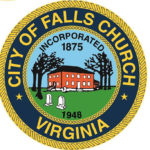 “The City of Falls Church is trying to help City businesses succeed through the pandemic with grants, special permits, and sharing resources and information,” Finarelli said in an email. “…The more businesses and non-profits than can benefit, the better for the entire community.”
“The City of Falls Church is trying to help City businesses succeed through the pandemic with grants, special permits, and sharing resources and information,” Finarelli said in an email. “…The more businesses and non-profits than can benefit, the better for the entire community.”
Approved Rebuild VA applicants may receive grants of three times their average monthly recurring eligible operating expenses, plus COVID-related expenses, up to a maximum of $100,000. Applicants who have received CARES Act funding are not eligible to receive reimbursement for COVID-related expenses under the Rebuild VA grant.
Eligible recurring operating expenses include:
- Payroll and benefits
- Mortgage payments
- Rent or Lease payments
- Utilities
- Principal and interest payments for business loans incurred before or during the emergency
Eligible COVID-related operating expenses, made on or after March 24, include:
- Expenses to comply with safety standards relating to COVID-19 prevention
- Expenses to reconfigure business facilities to comply with physical distancing standards, including the installation of drive-through windows
- Expenses for using or phasing-in touch-free technology or equipment
- Purchase of equipment, infrastructure, technology or other services to prepare for and respond to coronavirus
- Purchase of equipment, infrastructure, technology or other capital assets to prevent transmission and provide a healthy and safe work environment
An application guide can be viewed here. A list of required documents can be viewed here.
Photo via Governor of Virginia/Facebook
Finally, for the first time since March, McCabe’s Printing Group has seen a jump in sales.
The Merrifield based shop (8451 Hilltop Road), which typically specializes in promotional materials for schools and banquets, suffered a 50% drop in sales during the COVID-19 pandemic, according to operations manager Chris Ricci.
“Mid-March, everything dropped off the face of the earth in terms of work,” Ricci said. “It was kind of a shock, to say the least.”
But after forming a few new partnerships and changing tactics, Ricci said that the shop finally began to bounce back in August.
“I wanna say that businesses slowly and gradually reopening has definitely played a role in boosting morale,” he said, adding that the shop has seen a large increase for printed materials reminding people of safety procedures to prevent the spread of COVID, such as proper handwashing techniques and PSAs to wear a mask.
“We’ve been lucky,” Ricci said. “A lot of print shops had a lot of difficulties during this time, but the biggest goal is keeping at it.”
When the pandemic first hit, Ricci said that the shop received a federal PPP loan.
“That definitely helped us out, especially during the early months,” Ricci said. “We were one of the first ones to apply and get it.”
The shop is also awaiting a loan from Fairfax County, which Ricci is expecting to hit the accounts sometime next week.
Ricci said that he’s been with the company since he was a “wee little lad,” adding that he has family connections to the business.
For community members who want to keep supporting local and small businesses, Ricci said he wanted to remind people that there is a gap between the drive to support local shop owners in practice vs theory.
“The biggest disconnect that folks have is supporting local businesses but not supporting small business prices,” he said, adding that the printing industry has a very small sales margin to begin with.
Ricci encourages people to chat with the staff when visiting a small business, that way they can form a connection with other community members.
“There are not that many people at small businesses, so when you walk in, you could easily be chatting with the owner,” Ricci said.
Image courtesy McCabe’s Printing Group
“Shop local” has become a popular refrain during the pandemic as small businesses struggle with the economic fall-out and health risks from the coronavirus pandemic.
Several small businesses have permanently closed during the pandemic, but many have found ways to keep their doors from shutting. Owners have told Tysons Reporter over the last few months that affluent residents, loyal customers and community support give Tysons-area businesses advantages.
Fundraisers to support businesses’ operations and employees, social media efforts by residents to promote local eateries and loans and grants from the government also aim to keep small businesses alive.
Even as businesses grapple with the pandemic, many are giving back to the community.
Lebanese restaurants and shops are fundraising for relief efforts in Beirut. A Mosaic District dry cleaners turned into a mask factory. Local eateries are donating meals to help food-insecure people in Vienna. Falls Church Distillers switched to making hand sanitizer when there was a shortage in March.
Let Tysons Reporter know in the poll and comments below how much you have been spending at small businesses during the pandemic.
Photo by Lucrezia Carnelos/Unsplash
About a year after Wee Chic opened in the Mosaic District, COVID-19 restrictions temporarily closed the brick and mortar store. Now, the newly reopened kids’ clothing boutique is preparing for the fall.
Started in Maryland a little more than 10 years ago, Wee Chic made a quick pivot to e-commerce with curated boxes and an online store this spring. Just like owner Bridget Quinn Stickline predicted back in May, the reopened stores are currently offering steep discounts as Wee Chic looks to shed excess inventory and make way for fall clothing.
“We still have too much inventory,” Stickline told Tysons Reporter in mid-July. “Currently, we’re selling product up to 60% off. This is the good stuff that would have sold full price.”
With fall approaching, Wee Chic plans to make changes again — a “giant pivot cycle” as Stickline calls it — to keep the business going during the pandemic. Stickline stressed that the store is committed to serving shoppers with various comfort levels around COVID-19 precautions, from in-store browsing with required face coverings to online shopping.
Curated Boxes Returning
Wee Chic first promoted its curated “Shop Box” in the spring to help with the inventory overload, but put a pause on the box due to the summer sale.
As the store now looks to move away from being heavily discounted, Stickline said that she plans to relaunch the box for fall merchandise.
Here’s how the box works: employees talk to shoppers over the phone to pick out 10-20 pieces, which can include multiple sizes. When the box arrives, kids try on the clothes and parents send back whatever they don’t want. Shoppers who keep a certain number of pieces get a percentage off their entire order.
Because the box is not a subscription model, Stickline said that her employees work hard to pick out the right products.
“[Subscription services] have a chance to get it right,” Stickline said. “In our model, it’s one box. That one box has to be good enough.”
Stickline noted that while Wee Chic had been offering the box for awhile, the store hadn’t given it a name or marketing until the pandemic.
Loyalty Program
Bringing back the box isn’t the only upcoming move for the fall. Wee Chic is also looking to start a loyalty program — “Something we’ve wanted to do for a long time,” according to Stickline.
Stickline sees the loyalty program as a way to make her customers feel appreciated and also ease any strain on their wallets from the pandemic.
“Everyone I think is more concerned about spending right now,” she said.
Inventory Changes
Regular customers might notice some changes to Wee Chic’s inventory this fall. Unlike previous years, the store is now looking to reduce its party dresses and ramp up its toy and gift options as the pandemic affects clothing demand.
Wee Chic is also selling masks for kids and tweens, which Stickline calls “a little bit of a heartbreaker.” The masks include pastel colors, sharks, unicorns, corgis and more. “
“You still have to buy clothes,” Stickline said. “Some kids are going back to schools a few days a week.”
Even for families and school systems opting for fully virtual learning, Stickline noted that kids outgrow clothes quickly.
Parents normally have to size up for a few or all of their kids’ clothing pieces every season, with ages 2-5 usually seeing the fastest growth and ages 6-8 most likely for growth spurts, Stickline said.
Online Wish List
When the pandemic prompted social distancing and canceled in-person events, Stickline noticed that shoppers started to spend more on kids’ presents.
“I feel like people are giving slightly nicer gifts because they can’t go to showers,” she said. “[People] want to make more of a gesture. You’re sad for a kid who can’t have a birthday party when they’re 6.”
In pre-COVID times, kids could pick out items in the store for wish lists. Now, work is underway to create an online registry.
Stickline sees the online wish list as a way for would-be guests to send “a big box full of fun” to kids and their families celebrating birthdays and holidays.
“The role I see for us in the world as a business is we’re here to spread some cheer and make things better,” she said.
Photo via Wee Chic/Facebook




